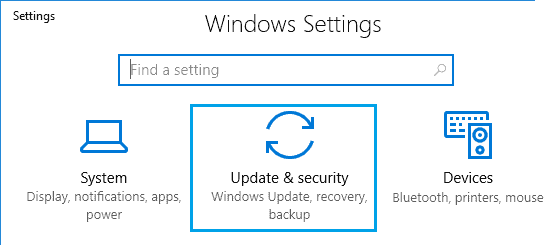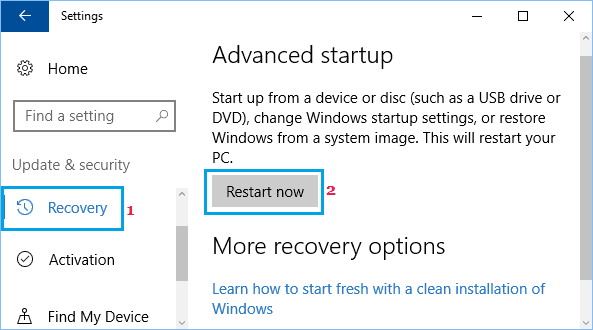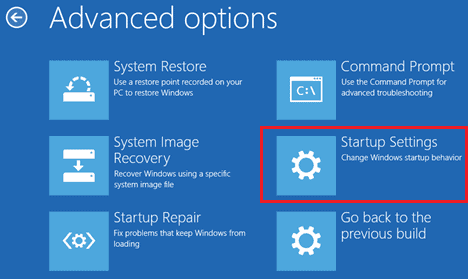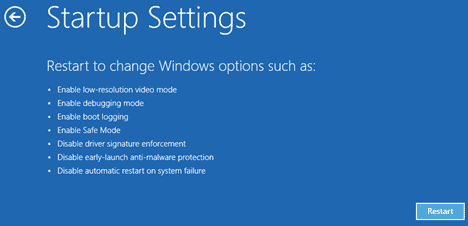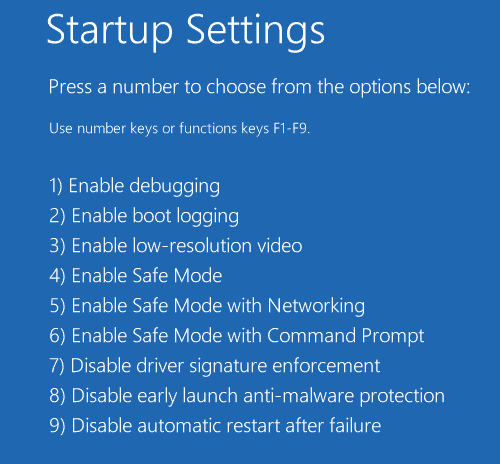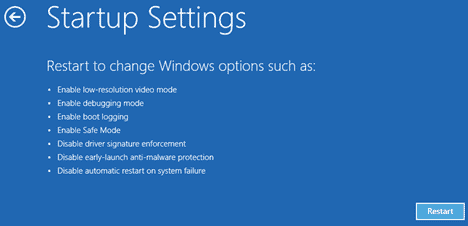
If you’re looking for a way to start your Laptop/Windows 10 in Safe Mode, you’ll find 5 easy and Different ways to Boot Windows 10 in Safe Mode below.
[lwptoc]
Boot Windows 10 in Safe Mode
When you boot your computer to Safe Mode, it starts in its fundamental state with only the most important system files and drivers.
If you can start a computer with issues in Safe Mode, it confirms that recent programes or computer changes cause the problem.
This allows you to fix problems with your computer by identifying the programe, service or the latest change that causes problems on your device. In Windows 10, you can enter Safe Mode with different methods as listed here below.
1. Start Windows 10 in Safe Mode Utilizing Settings
You can enter Safe Mode with an Advanced Startup option as available in Windows 10 if you are already logged in.
1. Go to Settings > Security and Update.
2. On the left-hand pane, click Recovery. Scroll down to Advanced Startup in the right-hand panel and click the Restart Now button.
3. Click on the Troubleshoot option after the computer restarts.
4. Click Advanced Options on the Troubleshoot screen.
5. Click Startup Settings on the next screen.
6. Click the Restart button on the Startup Settings screen.
7. Press the F4 key to Boot Windows 10 in Safe Mode after your computer restarts.
2. So, Boot Windows 10 in Safe Mode from Login Screen
Suppose you cannot log onto your computer, you can start the computer from the login screen by restarting Windows 10 in Safe Mode.
1. Click on the power > Hold the Shift key down on your computer’s keyboard and click on the Reset option.
2. Click on the Troubleshoot option after the computer restarts.
3. Click on the Restart button to navigate to Advanced Options > Start Settings.
4. Press the F4 key to Boot Windows 10 in Safe Mode after your computer restarts.
3. Enter Safe Mode From Black Screen
If a completely blank or black screen is used in Windows 10, you must first use Windows Recovery Environment (winRE) mode on your computer.
1. Hold down (for 10 seconds) the power button to turn your device OFF.
2. To restart your device, press the Power button again.
3. Repeat steps 1 & 2, until the computer enters winRE mode and you see the screen “Choose an option.”
4. Navigate to Troubleshoot > Advanced Options > Startup Settings from the option screen and click Restart.
5. Press F4 to Boot Windows 10 in Safe Mode after the Restarts computer.
Press the F5 button to start Windows 10 with the Networking option in Safe Mode to access the internet.
4. Enter Safe Mode Utilizing Bootable USB Drive
You should be capable to Boot your computer in safe mode using a bootable USB drive if your computer doesn’t start at all.
Suppose you don’t have a Bootable USB drive, you can use the steps provided in this guide, creating the Bootable Windows 10 USB drive, and making your Bootable USB drive on another computer.
1. Now. Insert bootable Windows 10 USB drive into your computer’s USB port and start the computer with a Power button.
2. Select a Keyboard Layout for your computer after the computer starts.
3. Click on the Troubleshoot option on the next screen.
4. Navigate to Advanced Options > Settings startup and click the Restart button.
5. Press F4 key to Boot Windows 10 in Safe Mode after your computer Restarts.
5. Enter Safe Mode Using System Configuration
Follow the steps below to use the System Configuration Utility to Boot Windows 10 in Safe Mode.
1. Click the Start button right and click the Run button.
2. Type msconfig on the Run Command Window and click OK.
3. On the next screen click the Boot tab, select Minimal Secure Boot option and click OK.
4. Click Restart on pop-up to start the Safe Mode boot process for your computer.
Also, Check :
If your computer restarts, it will be in Safe Mode with a Dark Background, and in the 4 corner of the screen you will see the words “Safe Mode.”
